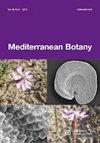Bioclimatic characterisation of the Subtropical Mountain Forests of Yungas at the northern extreme of Argentina: Sierras de Tartagal, Alto Macueta and del Alto Rio Seco (Salta Province)
IF 0.7
4区 生物学
Q3 PLANT SCIENCES
引用次数: 0
Abstract
The Subtropical Mountain Forests or Yungas at the northern extreme of Argentina (Sierras de Tartagal, Alto Macueta and del Alto Río Seco, Salta Province) were bioclimatically characterized for the first time. In this study, the methodology of the Bioclimatic Classification of Earth was applied. Twelve Temperature and Precipitation climatic parameters were used and three bioclimatic indices corresponding to 54 Bioclimatic Reference Localities (BRL) established in the study area were also calculated. From them we determined the bioclimatic units of each BRL at the level of Macrobioclimate, Bioclimate, Thermotypes and Ombrotypes. Subsequently, three bioclimatic maps (Bioclimate, Thermotypes and Ombrotypes) and two bioclimatic distribution maps of the forests and its vegetation belt (Premontane Forest and Montane Rainforest) were digitally developed using the QGIS software. The results obtained show that these forests are distributed within the Tropical Macrobioclimate and Tropical Pluviseasonal Bioclimate, with Upper Thermotropical and Lower Mesotropical thermotypes and Lower Subhumid and Upper Subhumid ombrotypes. The lowest vegetation belt, the Premontane Forest, is distributed between (≈400) 429-889 (≈900) m asl and exhibits two thermal variants: the warm Thermotropical Premontane Forest and the more temperate Mesotropical Premontane Forest. The Montane Rainforest is distributed at higher altitudes between (≈900) 965-1178 (≈1200) m als under Lower Mesotropical Thermotype. Both vegetation belts present two ombric variants, whose geographic distribution is determined by the precipitation gradient operating in the region: towards the West, the more humid variants are distributed under the Upper Subhumid ombrotype, while towards the East, the less humid variants are found under Lower Subhumid ombrotype. The present work constitutes the first bioclimatic study carried out in this forest formation applying the methodology of the Bioclimatic Classification of the Earth. It also lays the foundations and contributes whith valuable information to future floristic, vegetational, ecological and biogeographical studies and those focused on the conservation and sustainable management of native forests at the northern extreme of Argentina.阿根廷最北端Yungas亚热带山地森林的生物气候特征:sierra de Tartagal, Alto Macueta和del Alto Rio Seco (Salta省)
首次对阿根廷北部最北端的亚热带山地森林(sierra de Tartagal, Alto Macueta和del Alto Río Seco, Salta省)进行了生物气候特征研究。本研究采用地球生物气候分类的方法。利用12个温度和降水气候参数,计算了54个生物气候参考点(BRL)对应的3个生物气候指数。从宏观气候、生物气候、热型和温型四个层次确定了各地区的生物气候单位。随后,利用QGIS软件编制了3张生物气候图(生物气候图、热型图和温型图)和2张森林及其植被带的生物气候图(山地森林和山地雨林)。结果表明,这些森林分布在热带大生物气候和热带丰季生物气候中,具有上热热带和下中热带热型以及下半湿润和上半湿润型。最低的植被带,即前山林,分布在(≈400)429-889(≈900)m / l之间,表现出两种热变化:温暖的热热带前山林和更温和的中热带前山林。山地雨林分布在海拔(≈900)965-1178(≈1200)m之间,属于中热带低热型。两种植被带均呈现两种组分变化,其地理分布由区域内降水梯度决定:向西,湿润程度较高的组分分布在上亚湿润型下,而向东,湿润程度较低的组分分布在下亚湿润型下。目前的工作是应用地球生物气候分类的方法在这一森林地层中进行的第一次生物气候研究。它还为未来的植物区系、植被、生态和生物地理研究以及以保护和可持续管理阿根廷最北端原生森林为重点的研究奠定基础并提供宝贵的信息。
本文章由计算机程序翻译,如有差异,请以英文原文为准。
求助全文
约1分钟内获得全文
求助全文
来源期刊

Mediterranean Botany
Agricultural and Biological Sciences-Plant Science
CiteScore
2.40
自引率
10.00%
发文量
30
审稿时长
12 weeks
期刊介绍:
Mediterranean Botany (ISSNe 2603-9109), formerly Lazaroa, is a biannual journal that publishes original research studies in the field of Botany including plant systematics, vegetation ecology, biogeography, evolutionary biology, ecophysiology, community ecology, ethnobotany and conservation biology on Mediterranean biomes but also in interacting areas.
Mediterranean Botany is an OPEN ACCESS Journal, free of charges for any published article.
 求助内容:
求助内容: 应助结果提醒方式:
应助结果提醒方式:


